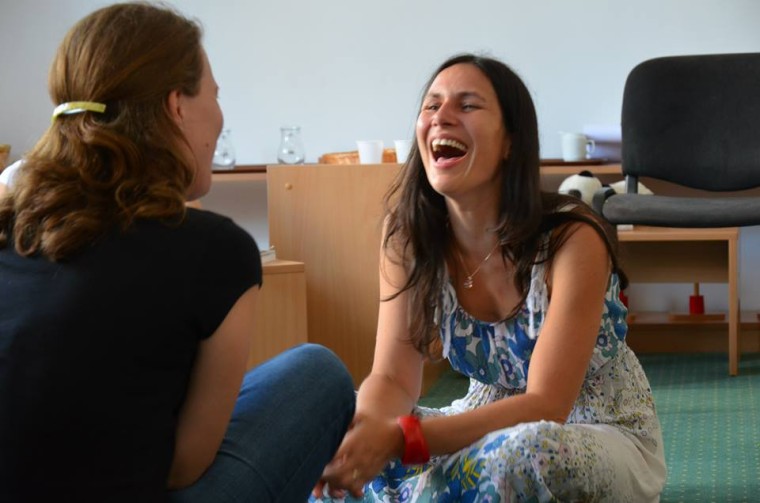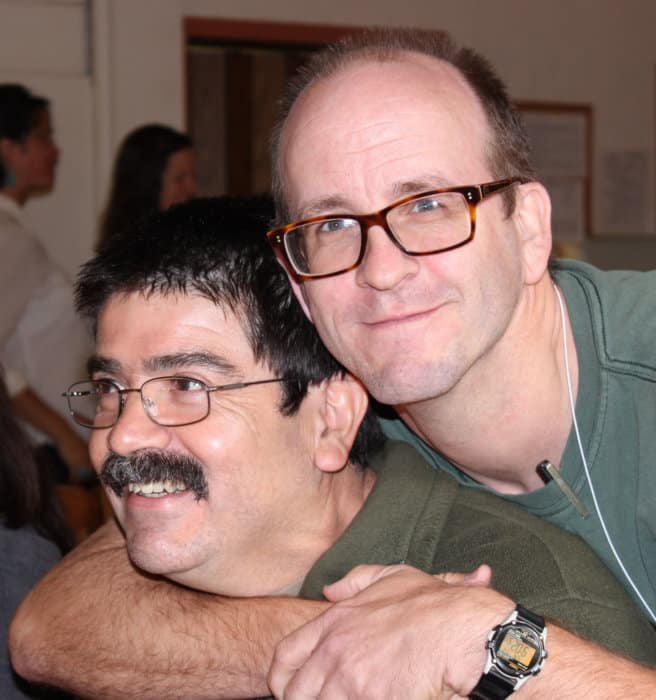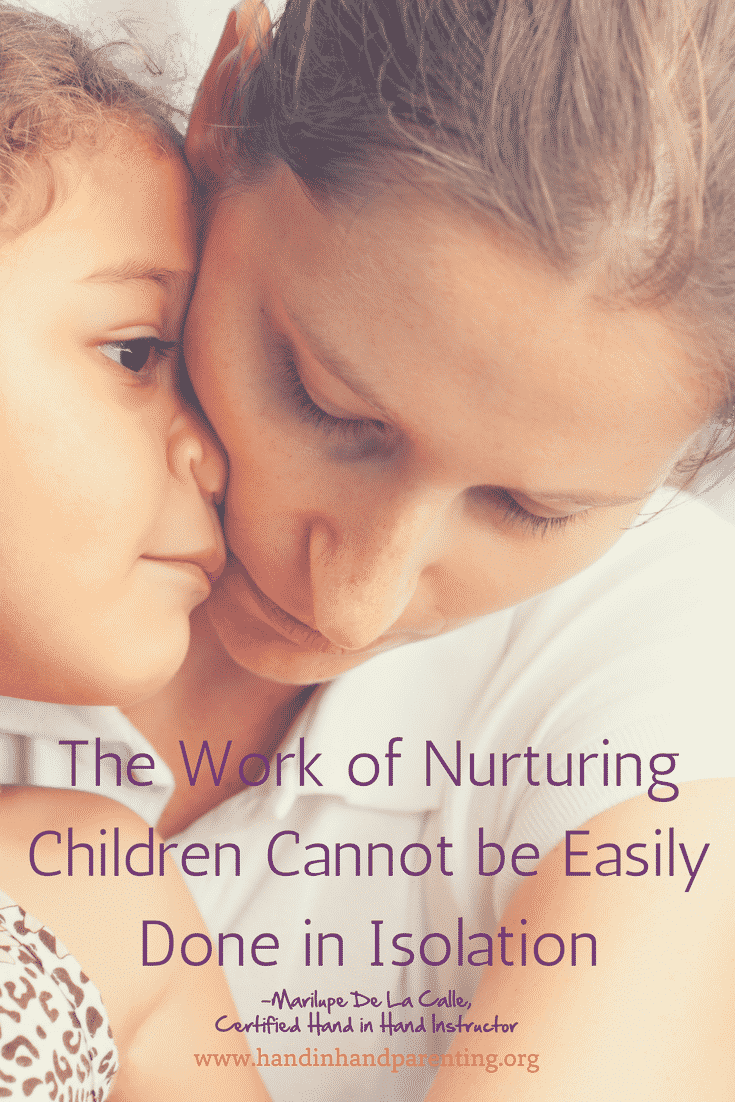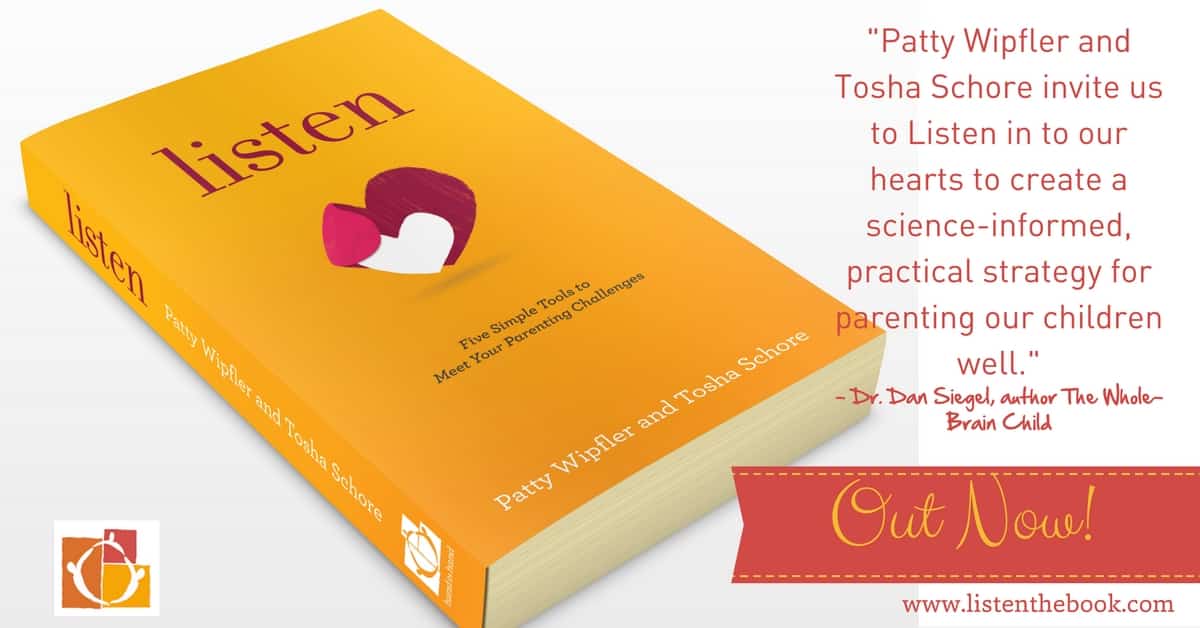Being a parent is hard work. It’s intense work. We shouldn’t be doing this work alone, but all too often, we find this to be the case in the modern world. When we parent alone, it brings up a lot of feelings which might include isolation, doubt, guilt, frustration, and inadequacy. And more! Most of us don’t take the time to deal with these feelings, but we put them aside at a cost. Managing feelings takes energy and erodes our patience. Loaded with feelings, it’s harder to connect with our children, to be fully present, or to be playful. We need support to work through the numerous feelings we have. Hand in Hand Parenting makes it possible to get support for ourselves through Listening Partnerships for Parents.
 Building a Listening Partnership, an exchange of listening support between adults, allows us an outlet for our numerous and mixed feelings so they don’t infect the time we have with our children. Building resource within ourselves through the caring attention of another adult provides the connection we need to think well, be more effective as mothers and fathers, and unleash our creativity and intelligence.
Building a Listening Partnership, an exchange of listening support between adults, allows us an outlet for our numerous and mixed feelings so they don’t infect the time we have with our children. Building resource within ourselves through the caring attention of another adult provides the connection we need to think well, be more effective as mothers and fathers, and unleash our creativity and intelligence.
Your first foray into Listening Partnership territory can feel like being “the shy one” at a middle school dance. All of us are a bit awkward when trying something the first few times in a relationship with someone else. So expect it to feel uncomfortable. Expect to feel unsure whether you are doing it “correctly.” But don’t let this stop you from taking initiative! It’s okay to try new things. Every eager learner makes mistakes. And even if it is hard for you to ask for help, this kind of support will make it easier for your tremendous love to shine through to your children.
 To understand the value and principles of a Listening Partnership, read the booklet Listening Partnerships for Parents (part of our Listening to Children Booklet Set). For a detailed video series including numerous Listening Partnership examples, you can take the self-directed class, Building a Listening Partnership. Here are several ideas on how to get started.
To understand the value and principles of a Listening Partnership, read the booklet Listening Partnerships for Parents (part of our Listening to Children Booklet Set). For a detailed video series including numerous Listening Partnership examples, you can take the self-directed class, Building a Listening Partnership. Here are several ideas on how to get started.
Finding a Listening Partner:
You’ll want to be on the lookout for a person you feel might notice who you are, how hard you try, and who you think could learn to see the good in you and your children no matter how squirrely your children’s behavior becomes on occasion. It really helps us to have people in our lives who can respect us and listen to us no matter how ragged we look, how out of sorts we are, or how desperate we feel. It’s important not to do this work alone, unseen and unacknowledged. We all need a community in which to thrive. Garnering that kind of support will help us in our efforts to be more fully present with our children.
Parents who are trying their best abound. Here are some good places to seek a Listening Partner:
- Friends (you’ll need to help them learn about the structure and guidelines of a Listening Partnership so chitchatting doesn’t encroach on Listening Time)
- Fellow nursery school parents
- Parent coops, parent clubs, parent groups
- Neighbors
- Relatives
- Minister
- Fellow church, temple, or synagogue members
- People learning about Hand in Hand Parenting in a class or group
- People from a Hand in Hand Parenting by Connection Starter Class or a talk/workshop
- Hand in Hand Parenting has a free space in our Hand in Hand Network where you can reach out for a Listening Partner. Create an account and join us there!
- Or invest in a Parent Club Membership
- Some Hand in Hand communities have local social gatherings where you can let others know you are looking for a Listening Partner
- Some Hand in Hand instructors offer Parent Support Groups in person and via zoom. This is a great place to meet other parents who are looking for Listening Partners. You can search the Hand in Hand web-site calendar for more information.
- Local Starter Classes and workshops.
If your Listening Partner is an existing friend, it’s good to review the ideas around confidentiality several times. We also recommend that your parenting partner not be your first Listening Partner. The two of you are very likely to have big feelings about the same kinds of situations, and this makes it harder to really listen to one another without judgment or advice. Once you learn how to use a Listening Partnership effectively, you can try it with a close friend or partner, and see how it goes.
A smart goal is to involve people you genuinely like and who exert a good influence on you and your children. You can aim to build a parent community around yourself so you aren’t struggling alone at home, or are avoiding the topic of parenting at work among other parents. You don’t have to ask someone who is sitting pretty. Don’t hesitate because a parent seems to be struggling too—we all are! Someone who openly admits that parenting is a real challenge can often be a person with whom it’s easier to exchange the favor of listening.
When I set up my first Listening Partnership, I was uncertain how it would go. I found a mother through Hand in Hand Parenting. We were very different, but I was open to an experiment. She was very good at getting to her feelings and she was so open about herself. The more I listened to her, the more similarities I found between us, and the safer I felt. Her openness also allowed me to explore myself a little deeper. In my Listening Time I was confused about how to handle a specific situation with my children and she told me, “It’s okay to be confused here.” She gave me a lot of permission to be myself, and she reminded me that I was still a smart person. I had numerous sessions with her where I could relate my uncertainty and confusion to my childhood that was riddled with alcoholism and abuse. It didn’t take me long to feel safe enough with her to cry, tremble, sob deeply, and sweat. I started to notice that I was gaining in clarity. It used to be that I would shut down when something out of the ordinary happened, and as you can imagine with kids, that was frequently. I have made huge progress in terms of being able to think on my feet, and to spontaneously meet my kids with listening, play, or a limit. Having the Hand in Hand tools made things easier, but I appreciated having more clarity of mind.
Getting Started:
 When you first approach someone to ask if he/she is interested in a Listening Partnership, an idea of what to say is, “I’m interested in this support tool for parents where adults listen to one another to help us learn more about ourselves, move through the hard parts of parenting, gain a bit more patience, and see if we can enjoy parenting more. Would you be interested in sharing support?”
When you first approach someone to ask if he/she is interested in a Listening Partnership, an idea of what to say is, “I’m interested in this support tool for parents where adults listen to one another to help us learn more about ourselves, move through the hard parts of parenting, gain a bit more patience, and see if we can enjoy parenting more. Would you be interested in sharing support?”
If the person says, “Yes,” you can describe more about how it works from the Listening Partnerships for Parents booklet. “We each take turns talking about what is good, and what is hard in parenting. We take an equal amount of time, even using a timer so our time is used effectively.” You can also add, “We listen to each other with respect, not giving advice, judging, or trying to fix each other, and everything is confidential.”
When making an inquiry with someone, especially on Hand in Hand’s web-site, it’s very effective to give the following information up front:
- Your name (first name may be sufficient)
- The days and times you are the most available for Listening Time
- How often you want to do Listening Time (one time for x minutes each way, weekly, periodically)
- The city where you live (so you can figure out the time zones)
- The ages of your children
- Any special considerations you are looking for if this is important to you (special needs, twins, teenagers, etc.)
- The best way to reach you
If someone is new to Parenting by Connection, you can read the booklet (part of our Listening to Children Booklet Set) Listening Partnerships for Parents together. With one of my new partners, we would read one principle each time right before a Listening Time. This allowed us to still have adequate Listening Time while learning one principle at a time.
Since you know it will probably feel a bit awkward at first, just commit to a trial period to make sure the time of day works and the relationship works. Something like 6-8 weeks is a good start. And please take the commitment seriously. It’s best if you are not multitasking and if you can be on time and set aside any distractions. At the end of each Listening Time, my partner and I always confirm our next meeting. I will say something like, “Are we still on for next week?” I have found this to be a very helpful practice, especially around holidays, vacation times, school breaks, and family illnesses. If the relationship is working, you can continue doing your Listening Time; if it isn’t working for you, it okay to let your Listening Partner know that. And then try to find someone else. There are many great parents who make excellent Listening Partners.
Through Hand in Hand Parenting, I found a mother in the United Kingdom who was looking for a Listening Partner and she had posted some mutually convenient times. We clicked right away. We were both single parents, but we also just enjoyed each other’s company. We’ve been doing Listening Time for three years now with every intention of continuing. I remember a session when I was working on my feelings of insecurity in social situations and feelings that I didn’t belong. I have social skills, but I knew that when I was stressed, I tended to internalize my stress and close doors to being warm and affectionate with others, even those I cared about. I assumed this was who I was. I was content to not be seen or heard during those stressful times. But I was noticing that I was doing this with my children too. With the stress of everyday life, I was turning inward and frequently choosing to do chores or organize our home non-stop rather than slow down and connect with my children. My Listening Partner and I Skyped every week, and I asked her to show some enthusiasm when I would walk into the view of the computer. I walked away from the camera and returned multiple times to her jumping up and down, whooping, and clapping, all with great enthusiasm. It was such a profound experience for me. Feeling her great joy to be in my presence kicked up feelings from my childhood, one in which I was never acknowledged when I walked into a room. I wasn’t noticed or seen unless I was doing something wrong. The safety my listener created allowed me to cry many tears for not being acknowledged. With my listener, I felt heard.
After that Listening Time, I started to notice how I was greeting my children. Was I in a hurry? Did I pause and listen? Did I rush them? Did I focus on connecting first? Did my children look me in the eyes? Did I worry more about the stress of that day rather than my children in that moment? I had a big shift internally in terms of being able to offer greater warmth and connection to my children, being outwardly affectionate, being more present, and letting them know verbally and non-verbally that I cherished their presence.
When to get Listening Time and Creative Strategies:
Sometimes it feels like there is never a break from our children. Sometimes we need to find those little nooks and crannies when we can get support. Early morning hours, after bedtime hours, naptimes, drop off at childcare, during school, and lunchtime in the middle of your workday may be possibilities for you. I have spent many hours doing Listening Time in my car on the phone.
You can also do a childcare exchange. It would take at least three adults to do this, but it has worked many times. A minimum of three adults and their children gather at someone’s house. One adult watches the children while another person gets listened to in a private space. After that person gets listened to, she goes and plays with the children, and the person watching the kids the first round listens to the other adult. You switch things around so each person gets a turn at each position.
You can also arrange for your child to go to someone else’s house while you get Listening Time with a friend in person or on the phone.
We also know people who have arranged a playdate or hired a fun-loving, attentive teenager to watch the kids for an hour while the two adults share Listening Time. Look around to see if there is a warm and interesting teenager so you can get things done and get Listening Time. There are young people out there who like kids and who have warmth and want to have a place to play without adults to mediate everything.
You Deserve Help
You deserve help. We all need help at some time or another. Help is appropriate. Help is just right for your family. And we can do a lot of this help with Listening Partnerships.
Lead your family. Get support for yourself. Get good acknowledgment for the amazing work you do. Give Listening Partnerships a try!
Out Now! Get Listen: Five Simple Tools To Meet Your Everyday Parenting Challenges in paperback, e-book or audio!

Save

